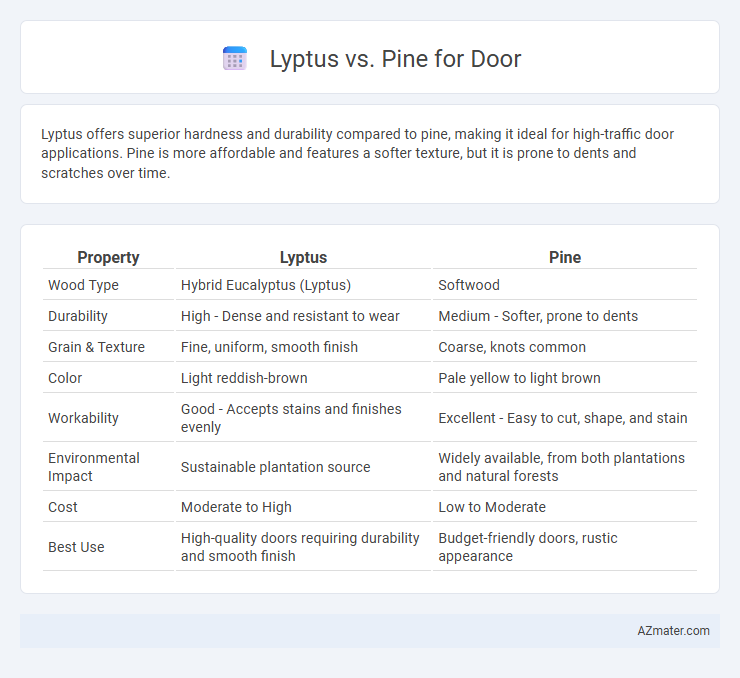Lyptus offers superior hardness and durability compared to pine, making it ideal for high-traffic door applications. Pine is more affordable and features a softer texture, but it is prone to dents and scratches over time.
Table of Comparison
| Property | Lyptus | Pine |
|---|---|---|
| Wood Type | Hybrid Eucalyptus (Lyptus) | Softwood |
| Durability | High - Dense and resistant to wear | Medium - Softer, prone to dents |
| Grain & Texture | Fine, uniform, smooth finish | Coarse, knots common |
| Color | Light reddish-brown | Pale yellow to light brown |
| Workability | Good - Accepts stains and finishes evenly | Excellent - Easy to cut, shape, and stain |
| Environmental Impact | Sustainable plantation source | Widely available, from both plantations and natural forests |
| Cost | Moderate to High | Low to Moderate |
| Best Use | High-quality doors requiring durability and smooth finish | Budget-friendly doors, rustic appearance |
Introduction to Lyptus and Pine for Doors
Lyptus, a hybrid hardwood derived from Eucalyptus species, offers durability and a fine grain ideal for high-quality door construction, combining the strength of hardwood with sustainable cultivation practices. Pine, a softwood commonly used for doors, is prized for its affordability, ease of staining, and natural knotty appearance, making it popular for rustic or budget-friendly projects. Both woods provide distinct aesthetic and performance characteristics, with Lyptus favored in environments requiring hard, wear-resistant surfaces and Pine chosen for its versatility and traditional appeal.
Physical Characteristics: Lyptus vs Pine
Lyptus wood exhibits a tight, uniform grain and a consistent reddish-brown hue, offering high density and hardness that enhances door durability and resistance to dents. Pine, in contrast, features a softer texture with a lighter, yellowish color and more prominent knots, making it easier to machine but more prone to dents and scratches. The physical characteristics of Lyptus make it more suitable for doors requiring strength and a smooth finish, while Pine is favored for its affordability and ease of customization.
Durability and Strength Comparison
Lyptus wood offers superior durability and strength compared to pine, making it ideal for doors subjected to heavy use or harsh conditions. With a Janka hardness rating of approximately 1,420, Lyptus resists dents and scratches better than pine, which has a lower rating around 380. Its dense grain structure enhances stability and longevity, outperforming the softer, more porous pine wood prone to dents and warping over time.
Aesthetic Appeal and Grain Patterns
Lyptus wood features a consistent, fine grain with a warm reddish-brown hue that enhances door aesthetics with a sleek, modern look. Pine offers a lighter, more rustic appearance with prominent knots and varied grain patterns that add character and a natural feel to doors. The choice between Lyptus and Pine depends on whether a smooth, uniform finish or a textured, traditional style is desired for door design.
Sustainability and Environmental Impact
Lyptus, a hybrid eucalyptus species, is known for its rapid growth and efficient reforestation, making it a highly sustainable choice for door manufacturing compared to traditional pine. Pine, while widely available, often comes from slower-growing forests that may contribute to deforestation and habitat disruption if not sourced responsibly. Choosing Lyptus supports sustainable forestry practices due to its lower water usage and higher carbon sequestration rates, resulting in a reduced environmental impact over the product lifecycle.
Workability and Ease of Installation
Lyptus offers superior workability compared to pine due to its uniform grain and hardness, which reduces splintering and allows for smoother cutting and sanding. Pine, being softer and more prone to dents, can be easier to nail but may require extra care to avoid damage during installation. Both woods are lightweight, but Lyptus's durability results in a more reliable door installation with less need for adjustments post-fit.
Cost and Availability
Lyptus wood generally costs more than pine due to its hardwood density and durability, making it a premium choice for doors. Pine is widely available and more affordable, often sourced from fast-growing softwood trees that ensure steady supply and lower price points. Availability of lyptus can be limited depending on geographic location, whereas pine is commonly stocked in most lumberyards nationwide.
Maintenance Requirements
Lyptus doors require minimal maintenance due to their dense, hard-grain composition, making them more resistant to scratches and dents compared to pine. Pine doors often demand more frequent sanding, sealing, and refinishing because of their softer wood structure, which is prone to dents, cracks, and moisture absorption. Regular application of protective coatings on pine is essential to prevent warping and prolong door lifespan.
Common Applications in Door Construction
Lyptus wood is commonly used in door construction for its durability and smooth finish, making it ideal for interior doors and decorative panels. Pine, known for its affordability and ease of machining, is frequently chosen for lightweight interior doors and frames. Both woods serve distinct purposes, with Lyptus favored for premium, long-lasting doors and Pine often selected for budget-friendly, versatile applications.
Choosing the Right Wood: Lyptus or Pine
Lyptus wood offers superior durability and a smooth, fine grain ideal for high-quality interior doors, while pine provides affordability and ease of customization with its softer texture. Pine's natural knots and resin pockets create a rustic appearance, favored in casual or traditional settings, whereas Lyptus boasts greater resistance to warping and insects due to its eucalyptus hybrid composition. Selecting between Lyptus and pine depends on the desired door aesthetics, budget considerations, and the need for longevity and structural stability.

Infographic: Lyptus vs Pine for Door
 azmater.com
azmater.com